By Laurie Kulikowski
The Street
For all the glitz and glory associated with being a sports star, the sad fact is that many professional athletes have short shelf lives. And once the last ball is thrown or layup made, endorsements are quick to fizzle.
Sports stars have notoriously been known to blow their earnings, either from aggressive agents who advocate investments that promise high returns or from their own extravagant lifestyle spending on cars, cribs (as in homes) and bling.
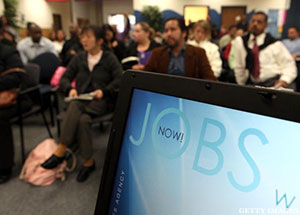
A 2009 Sports Illustrated story highlighted that just two years after retirement, 78 percent of NFL players "have gone bankrupt or are under financial stress because of joblessness or divorce." Further, within five years of retirement, "an estimated 60 percent of former NBA players are broke."
Sports associations are looking to guide their players into more stable careers once they retire. And professional athletes are increasingly betting on the franchise industry as a safe place to invest their money.
As bank credit remains elusive, the franchise industry is encouraging more players, with large checkbooks at their disposal, to sign on. While they may not take food orders or man the grill, there are a host of former players behind the scene.
"It's an untapped market," says Miriam Brewer, the senior director of education and diversity at the International Franchise Association. "Granted, there are growing numbers of athletes already in franchising. If we can reach [players] while they're still playing, they come with the financial backing. They're not going to have necessarily go through a bank or try to get an SBA loan. They have the resources to do it."
Still, the business of franchising was little known to many stars. Not anymore.
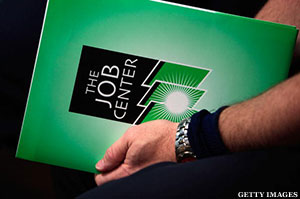
Besides working with the NFL Career Transition Program and the NBA to promote franchising, the IFA last year launched an effort with the Professional Athlete Franchise Initiative, or PAFI. The two-year-old organization, founded by former NFL cornerback Michael Stone, considers itself a liaison between franchisor and athlete and an education resource for athletes.
"Our goal is to educate athletes about franchising as a potential second career," Stone says. "We like franchising as opposed to pure entrepreneurism because it gives the athletes a little bit of coaching along the way and a support structure," which is similar to that of the sports world.
Last October, the IFA and the PAFI created a formal franchise education platform designed to attract prospective franchisors. The athletes who completed the PAFI Franchisee Education Program and became franchise owners would also receive credit toward a Certified Franchise Executive (CFE) designation, which is administered by the IFA Educational Foundation.
TheStreet highlights five sports celebrities who have adopted franchising as their next play:
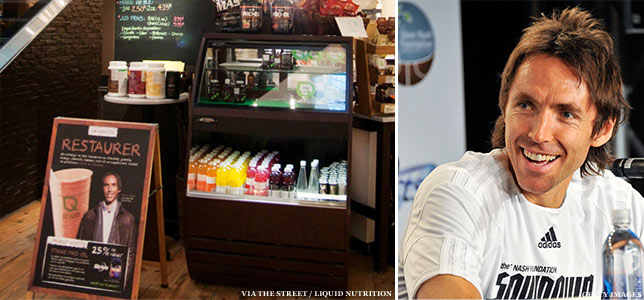
NBA All-Star Steve Nash, who has played for the Phoenix Suns, Dallas Mavericks and was recently traded to the Los Angeles Lakers, has a thing for healthy living. He brought that mindset to his business ventures as well. Nash is an equity partner in Liquid Nutrition Group, a smoothie and supplements chain based in Montreal, and now has committed to opening 20 franchises in British Columbia.
Liquid Nutrition President Glenn Young, a former executive at IMG Media, one of the largest distributors of sports programming, says Nash was an equity partner for several years before the company started franchising in May 2011.
Nash was involved in the company's strategy sessions about franchising. "When we launched the [franchise] program, he was one of the first of our athletes to take advantage of the early opportunity to acquire territories," Young says.
The first of Nash's stores will open in the next few months, the company says.
The company has nine locations open in Canada but has commitments to open up to 70 more, most in the U.S., and plans for its first store in Abu Dhabi. Liquid Nutrition will have a total of 20 units open by early next year.
Besides Nash, Liquid Nutrition has brought on other sports stars as equity partners and "brand ambassadors," including Tampa Bay Lightning star Vincent Lecavalier, Atlanta Falcon's quarterback Matt Ryan, New York Yankee Russell Martin, LPGA's No. 2 ranked women's golfer, Suzann Pettersen, and Olympic gold-medal snowboarder Torah Bright.
These players are "very active within their sports. They don't have a whole lot of spare time to do build outs. We help them identify local partners to run the day-to-day on their behalf," Young says. "The business itself gets the benefit of having a guy like Matt Ryan in Atlanta put his face on the brand."
"Juice bars and smoothies are growing by leaps and bounds. It's clearly the next emerging category. Our stores have become almost wellness centers for customers. They're not coming in for a dessert. They're coming in because it has a functional benefit, it's a meal replacement, it's a detox, it's high protein," Young says.
Young says for the relatively inexpensive capital investment -- $150,000 for one unit, exclusivity in a market would total 10 units at $1.5 million -- there is a "sizeable net return" on the investment.
For the players, it works because "they're buying into an established system. There is equity in the system already. They don't have to start from scratch. If you can match a pro athlete to a business they have great passion for, then it's a win-win for everybody," Young says.
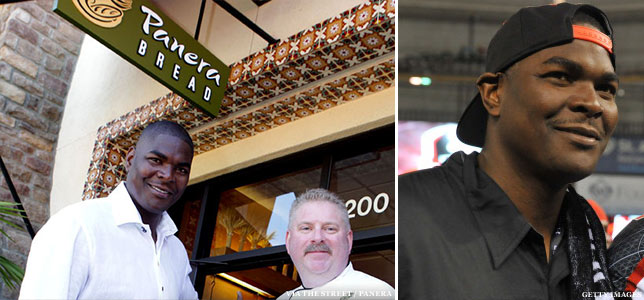
In 2006 Keyshawn Johnson, a former wide receiver for the Jets and Bucs, and a commentator on ESPN's Sunday NFL Countdown and Monday Night Countdown, teamed up with several experts in business development and food service and hospitality to form First Picks Management. First Picks is a development company that focuses on franchise businesses in the food-service and hospitality industries. Two franchises among First Picks' portfolio are Cold Stone Creamery (the company has partnered with a multi-unit franchisor in Dallas) and Panera Bread -- one of Johnson's favorite eateries.
The company opened its first Panera in California in 2007. First Picks will have a total of 10 Panera stores open by the end of the year.
"I was looking for a concept that made sense both economically and that I liked," Johnson told TheStreet in October 2011. "Panera was one of those brands I would frequent quite often. It didn't even really dawn on me that it was Panera. I was just going there and eating and buying the food. As I started to get into the franchise business, this was one of the businesses that came up, and I was, like, 'Wait a minute. I know that logo.' "
The restaurant business is not far from Johnson's comfort zone. He had previously owned Reign, a southern-style restaurant in Beverly Hills, and Profusion in Tampa, Fla.
Stand-alone restaurants are a "little harder in terms of maintaining" compared with a proven franchise "where you have a blueprint you follow and understand," he said.
"Once I started getting into the business model it, just made all the sense in the world," he added. "It's a growing business and wants to grow on the West Coast. It became the perfect opportunity for me."
More recently Johnson has brought on some of his NFL friends as investors in the development company, including Reggie Bush, Dennis Northcutt, Anthony Henry and Terence Newman, Keith Rivers as well as retired NBA player Joe Smith.
Johnson aims to keep expanding in his own territory (which allows for up to 25 restaurants) and others between California's Central Coast and Metro Los Angeles, including the area around the University of Southern California, where he went to school.
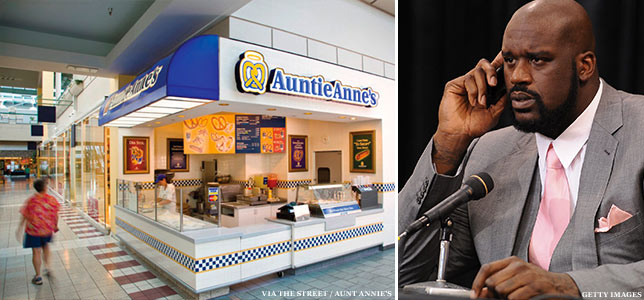
Retired All-Star NBA player Shaquille O'Neal owns 19 Auntie Anne's through his investor group, The O'Neal Franchise Group.
The group teamed with Milwaukee-based V&J in 2007, owned by longtime multi-unit franchisee Valerie Daniels-Carter, to form the VJ & O'Neal Enterprises Group for the primary purpose of owning and operating the Auntie Anne's stores.
According to Auntie Anne's, Shaq is only an investor in the franchises. He does not do any marketing or promotions for the pretzel brand.
Besides, Shaq is quite a businessman. The O'Neal Franchise Group is a subsidiary of The O'Neal Group, a commercial real estate venture Shaq formed in 2006. According to the company's Web site, it seeks to "acquire, develop and promote landmark real estate offerings that provide integrated lifestyle opportunities and/or improve the economy for previously underserved, underperforming areas."
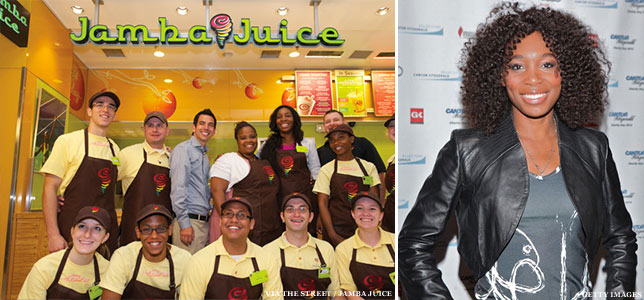
Tennis star Venus Williams signed on as a spokeswoman for Jamba Juice in May 2011 to promote the brand and become a franchise owner of the smoothie company.
She currently has three stores open in the D.C.-Maryland market and plans to open two more.
"My goal is to help inspire our nation's youth to become more active and to make better dietary choices. As a recognized healthy, active lifestyle brand that offers simple menu solutions for eating right while engaging in healthy activities, Jamba Juice is a perfect fit to help me in that endeavor," Williams said last year.
In her role as the company's spokeswoman, Williams represents the brand in key advertising and marketing campaigns and through personal appearances, and digital and social media activities, Jamba Juice says.
Last month, Jamba Juice partnered with ESPN commentator and former NBA star LaPhonso Ellis. Through his franchise company, Blended Blessings, he owns two Jamba Juice locations in Indiana. Ellis plans to open four additional Jamba Juice stores in and around Indianapolis over the next four years.
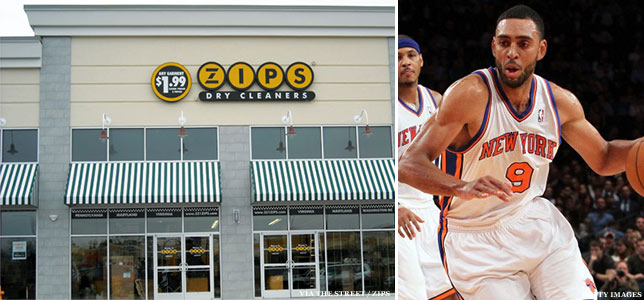
Pro basketball player Jared Jeffries signed his first franchise agreement in July. The New York Knick, along with business partner Shawn Strader, agreed to open a ZIPS Dry Cleaners in northern Virginia by the end of 2012.
"Owning a franchise was the next logical step for me and Shawn, and ZIPS provided a safe and promising way to ease into the industry," Jeffries said in a July press release.
ZIPS Dry Cleaners launched in 1996 and began franchising in 2006. The company has more than 35 locations on the East Coast and is proving to be popular with customers due to its same-day service and fixed price of $1.99 for any garment to be dry cleaned and $1.39 for any shirt to be laundered.
The company adds that, because it is a prepaid business, its helps keep prices down and inventory steady for owners. ZIPS says less than 10% of total costs go toward supplies and inventory.
"It's a good fit, because franchising parallels sports," he said. "Athletes are executors. You follow prescribed movements put together by a coach and organization to win a ball game. In franchising, you have the game plan and business model put together by the franchisor. Like an athlete, the operator has to come in and execute the plan."
Jeffries, who has also played for the Washington Wizards and Houston Rockets, has been business partners with Strader since the two started their own company specializing in residential real estate investment in 2007. The company, JV Management, currently owns properties throughout Florida, New York and Washington D.C., as well as freestanding land in Ohio.
"We couldn't be happier about investing in an exciting franchise that is poised for tremendous growth," Strader said, referring to U.S. Bureau of Labor Statistics that highlighted dry cleaning as one of the next decade's hottest industries.
"We've had our eyes on ZIPS from afar and have been impressed with the incredible amount of leadership and industry experts they have assembled. We look forward to being part of the team," Strader added.
More From The Street:
-- 10 NFL Star Homes You Can Own
-- 10 Best Fresh Hop Beers
-- 10 Best Premium Seats For The NFL Season
-- 5 Best Cars Under $15,000








